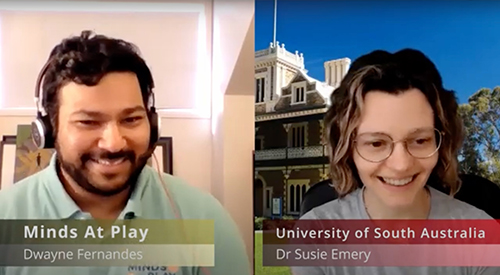 UniSA has partnered with social gaming company Minds At Play to better understand how roleplaying games can build social skills in people who are neurodivergent or live with disability.
UniSA has partnered with social gaming company Minds At Play to better understand how roleplaying games can build social skills in people who are neurodivergent or live with disability.
Are you a wizard, warrior, cleric, or rogue? Do you embrace chaos, order, or some pragmatic mix of the two? Do you solve problems through strength, intelligence, or charisma?
For more than 50 million people globally, these are not strange, abstract questions; they're central to a pastime that lets them explore other worlds and experience unknown wonders - tabletop roleplaying.
A cult sensation in the 80s, tabletop roleplaying games (ttRPG) such as Dungeons & Dragons (yes, that's the one in Stranger Things), have matured into a global phenomenon that is now enjoyed by people of all ages, from all walks of life.
Alongside this burgeoning mainstream popularity, there has emerged growing recognition that ttRPGs can help players - particularly those who are neurodivergent or living with disability - improve social skills and self-confidence in a safe, enjoyable environment.
One of the leading social gaming companies in Australia is Minds At Play, a Sydney-based team that runs online ttRPG sessions providing a safe environment for neurodiverse players to have positive social experiences.
Inspired by the positive outcomes Minds At Play has seen among its players, the University of South Australia has partnered with the organisation to better understand how ttRPGs can help build social skills, and how those benefits might be applied to a wider range of circumstances.
Led by UniSA gaming expert Dr Susie Emery and Minds At Play Ambassador of Amazement, Dwayne Fernandes, the partnership is exploring how ttRPGs could be used in a wider educational context, such as inclusive learning frameworks for neurodiverse students and those with disabilities.
"I am a games researcher and I look at how games can be used for education and social change," Dr Emery says.
"Games are really good in that sense, because they engage us in an experience, and they let us explore different ways of thinking or being or seeing the world that other mediums can't - we can read a book about what it's like to go to Mars, but if we play a game about going to Mars, we can literally be the astronaut, walk around, make choices, and change the world with our actions.
"Seeing the work that Minds At Play do with tabletop role-playing games, I realised a lot of those benefits carry across to ttRPG, and so for me, as a researcher, this was an interesting space that I hadn't really looked at before.'"
Dr Emery and her team are examining the way that Minds At Play develops, supports, and delivers its bespoke adventures, which are run using existing ttRPG rulesets, with custom narratives to suit the learning outcomes of the program and inclusion practices such as employing neurodiverse Game Masters.
Fernandes says Minds At Play is excited about the opportunity to build a robust evidence base and deeper understanding around a process that they know, from experience, provides very positive social outcomes.
"We've noticed behavioural changes in our players and how they interact since they started with us and how they transition over time and what that means for them personally as they take steps into the real world from our digital platform," Fernandes says.
"What I like about having a gaming academic in our space is that Dr Emery was able to identify things that the general public doesn't understand about the benefit of gaming, and specifically ttRPGs.
"We see it because we are playing these games with people on a regular basis and we identify the change in them, but working with UniSA is a chance to better understand this process."
Dr Emery expects the outcomes of the partnership with Minds At Play will deliver insights that can be used to support and promote the positive benefits of gaming activities around the world.
"The Minds At Play model is about social growth and social experience - trying new things, playing new roles, taking on new identities, but also learning about other people," Dr Emery says.
"So, you learn about other people in your party and understanding their choices and their experiences and what other people are thinking and what other people are doing, and just having those opportunities to experience that and experiment with that in a safe space that's guided and supported.
"I think it's just the coolest approach, and literally anyone can benefit from this - anyone in the world would have an awesome experience and would learn cool things and be exposed to different people and different experiences from playing ttRPGs."
Watch a video here to learn more about the partnership between UniSA and Minds At Play.






